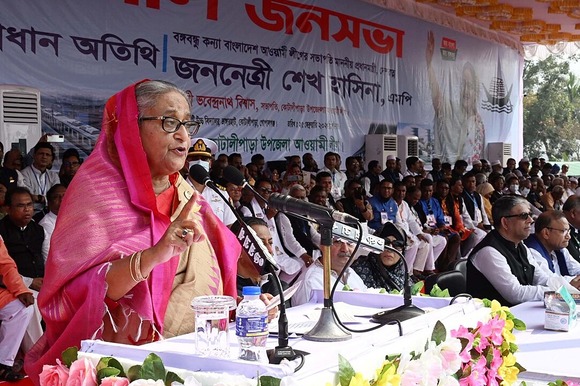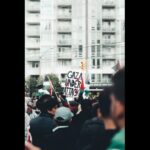Bangladesh’s interim government has imposed a ban on all activities of the Awami League, the political party of ousted former Prime Minister Sheikh Hasina, invoking the country’s Anti-Terrorism Act and citing concerns over national security.
The decision was officially announced late Saturday, following several days of widespread street protests spearheaded by the National Citizen Party—a newly formed student-led political group that emerged in the aftermath of last year’s uprising which led to Hasina’s removal from power.
The protests gained further momentum as several Islamist and right-wing parties, including Jamaat-e-Islami and various other opposition factions, joined the demonstrations. These groups have been vocal in their demand that the Awami League be officially designated as a terrorist organization.
In its statement, the interim government said the ban will remain in effect until the Awami League and its leadership are brought to trial for their alleged role in the deaths of hundreds of demonstrators. These deaths occurred during violent crackdowns on protests connected to proceedings at the International Crimes Tribunal (ICT).
In a significant legal development, the government also announced an amendment to the ICT Act. The revised law now grants the tribunal authority to prosecute not only individuals but also political parties and organizations. This legal modification paves the way for the Awami League to face prosecution as a collective entity for alleged offenses committed during its time in office.
The Awami League, which has been a dominant force in Bangladesh’s political landscape since its founding in 1949, has dismissed the move as illegitimate. In a post on its official Facebook page, the party declared, “All decisions of the illegal government are illegal,” rejecting the authority of the interim administration.
Political tensions have escalated significantly across Bangladesh in recent months. The unrest has continued to mount since August, when violent protests forced Sheikh Hasina to flee to neighboring India. In the wake of her departure, an interim government led by Nobel Peace Prize laureate Muhammad Yunus assumed control of the country.
Yunus, who has promised wide-ranging reforms, indicated that national elections could be postponed until 2026, allowing the interim government time to implement structural changes and stabilize the political situation.
The roots of the current unrest trace back to July, when students began protesting over public sector job quotas. However, the protests soon escalated into broader anti-government demonstrations, evolving into one of the most violent political crises in Bangladesh since its independence in 1971.
In a related move, the government had previously banned the Awami League’s student wing, the Bangladesh Chhatra League, in October. The organization was officially labeled a “terrorist organisation” by the authorities, citing its direct involvement in violent attacks against demonstrators.
As Bangladesh navigates this turbulent political chapter, the future of one of its most historically significant parties remains uncertain, pending legal proceedings and the broader trajectory of the country’s democratic transition.






